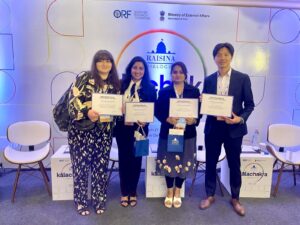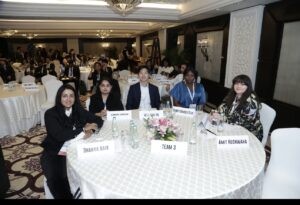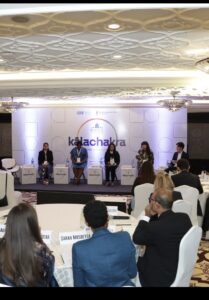By Dhanya Nair, M.A. in Political Science and Government, SPSIA



A call came for Dr. Yogesh Joshi in early January asking whether I would like to attend the Raisina conference in India. That conversation was the beginning of a journey to New Delhi where Prime Ministers, cabinet members, politicians and scholars from around the world would gather under one umbrella. The mission of the meeting was ambitious and centered on a general theme Kalachakra or the wheel of time. It was meant to remind everyone of the passage of time, the urgency of the moment, and the guarantee of change. The organizers hoped to bring attendees together to discuss and debate the challenges facing a broad range of topics but related to ‘people, peace and the planet.’
The different forums gave pundits and politicians the opportunity to voice their concerns and present solutions to the audience. Leaders from industry, media, and academic institutions rubbed shoulders with government ministers from both civil and defense departments from all over the globe.
Officially referred to as the ‘Raisina Dialogue,’ India’s Ministry of External Affairs developed the international conference to facilitate an exchange of ideas and critical analysis of political and economic challenges facing the global community. The endeavor originally began in 2016 with the goal of integrating India’s role in Asia with the broader objectives of international institutions around the world, following the framework of the global strategic and security Shangri-La Dialogue in Singapore.
Regional stability, world order, connectivity, and initiatives centered on the Global South were part of the agenda at that time. The conference was the first of its kind for India and set the stage for future engagement. This year (2025) would mark the 10-year anniversary of the conference, and it was a showstopper by all measures.
India stands at an inflection point where it has the potential to lead the conversation on a wide range of issues related to geopolitics, economics and climate change. Raisina Dialogue serves as a public forum where dialogue, debate and disagreements could lead to an exchange of promising ideas and beneficial partnerships. This flagship conference is a signal to the rest of the world that India is not only ready to do business, but uniquely qualified to facilitate conversations on the most pressing problems facing humanity.
India has navigated a policy of multilateralism at a time when bilateral agreements are making a comeback. It has deployed a pragmatic approach to great power politics and clearly recognizes the risks and rewards associated with a multipolar world.
While I was not aware of the details of the gathering or the magnitude of the honor, Dr. Joshi, the head of The India Center at UCF, had colleagues from graduate school who were now organizers and managers of the Raisina Dialogue. The Observer Research Foundation (ORF) is the Indian think tank that co-sponsors and helps organize the event. Its role as the premier non-partisan organization that provides research on an array of topics including economic development, international relations, strategy and security, makes it uniquely qualified to help host the event.
Dr. Joshi was tasked with preparing his student nominee for the conference. His perspective on the development in the region, the challenges facing multilateralism and India’s unique objectives in advancing that policy was the starting point of a mini lecture series that he conducted at UCF library’s coffee spot.
The student challenge, titled “Building Bridges: Mitigating the North-South Divide,” was held in conjunction with the conference and brought together graduate students from 60 countries. It was coordinated by IE University (Spain) that sorted students into groups and provided mentors who guided the discussions. Differences in language and culture, along with demanding schedules, were worked out to produce a final paper and presentation.
While most students came prepared to debate IR theory, it was the call for innovative policy solutions that were difficult to deliver. The dominance of the Global North in all facets of international institutions posed challenges for the teams assembled at Raisina. Deconstructing the hierarchies built into the international system was the first task. This was followed by the addition of measures that would provide countries in the Global South with a seat at the table. Debates on how to bring technology to underserved areas were also addressed.
The students quickly began to realize that this was an exercise in real world policy making and given the regional differences of the attendees, it was not an easy task.
This year marked a transition where India began to set the benchmark for engagement. Raisina has fully embraced the opportunity to charter a new course on dialogue. Essentially, the discussion has shifted from pressing problems on the domestic front to tackling larger global issues.
A metamorphosis has taken place with respect to statehood. The shackles of colonialism had left its mark on the country, but 78 years since independence, it has emerged from its cocoon to join the ranks of a new international order. I have often remarked that although India is not known for its mineral deposits or abundant natural resources, grey matter was always present in abundance.
A lack of cooperation, coordination, planning and long-term objectives held the country back from making the quantum leap from the third world. There have been dramatic changes to the country’s productivity, infrastructure, and cooperation. A common purpose, guided by the management of Prime Minister Modi, has drawn a path forward for the country.
The tone set by the P.M. and the Minister of External Affairs, Dr. Jaishankar, was remarkable. They made it clear from the onset that they were present to listen and engage with participants but not make speeches. The exchange of ideas was the goal.
The conference contributors, including the U.S. Director of Intelligence, Tulsi Gabbard, spoke at length about a variety of topics that concerned attendees. India is experiencing rapid transformation on every level. The threat of terrorism, disruptions in global supply chains, rapid economic expansion without the necessary safety nets, and the task of meeting the educational needs of a large population still need to be addressed on the subcontinent.
Travel back and forth to India for the past four decades has given me an opportunity to view those changes through the lens of an observer. It used to be that if you were returning after an absence of ten years, some changes would be visible. Today, that rate of transformation is much closer to 1 to 2 years. These are tangible changes to major sectors like banking, infrastructure, urban planning, and manufacturing.
A user-friendly environment where technology and other innovative tools are harnessed to create a more equitable, modern India is becoming a reality. The country still faces severe challenges that could derail progress, but it is clear that the future looks bright.
Attending the Raisina conference was a transformative experience that gave me valuable insight into international affairs and policy making at the international level. The opportunity to address Heads of State, academics, other dignitaries and interact and ask questions about public policy or current events was unparalleled. The value of that experience cannot be understated.
On our last night at the conference, the students attended a dinner hosted by the Spanish Ambassador to India at his official residence. The highlight of the evening was the conversations with the Ambassador and the staff who work alongside him at the Embassy. These interactions represent an unparalleled opportunity for UCF students to engage with a wider international community that they could not get anywhere else.